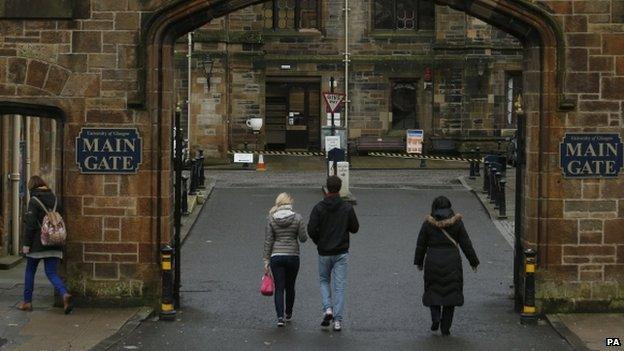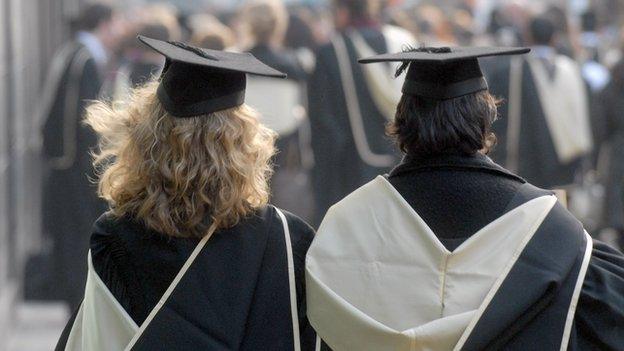Scottish independence: Universities Scotland call for clarity over post-Yes tuition fees
- Published

The Scottish government wants to continue charging students from the rest of the UK fees to study at Scottish universities if the country votes "Yes" to independence
The body that represents Scottish universities has called for more details on charging tuition fees to students from the rest of the UK after independence.
Prof Pete Downes, from Universities Scotland, was giving evidence to Holyrood's education committee.
He said he would like to see how the Scottish government would ensure it complied with European law.
Students from other EU countries are entitled to free tuition in Scotland.
The Scottish government has said it could continue to charge students from the rest of the UK if there was a "Yes" vote in September's referendum.
Students from Scotland are entitled to free tuition at Scottish universities but students from the rest of the UK (rUK) are charged fees of up to £9,000 a year.
Any move to continue charging tuition fees to students from England, Wales and Northern Ireland after independence is expected to face a challenge under European law.
White paper
The Scottish government said that Scottish universities could be overwhelmed by students from the rUK if they had to be given free tuition too.
In its White Paper on independence the Scottish government proposed continuing with the current arrangements.
But opponents of independence claimed this might be impossible because students from the remainder of the UK would need to be treated in the same way as those from other EU countries.
If tuition fees continued for rUK students, the policy would almost certainly face a challenge under European law, which could take years to resolve.
Complicated legal advice for Universities Scotland, which represents 19 universities, argued that it might be possible to continue with fees in very specific circumstances - essentially to avoid the universities system in Scotland becoming "distressed".
Prof Downes said he was not calling on the government to publish its own legal guidance but would like more details of the arguments they would use to provide an "objective justification" for continuing with the current arrangements on fees.
He said the legal opinion Universities Scotland had sought differed from the proposal set out in the government's White Paper.
Its advice stated there was a case for charging fees for students from all other EU member states, including the rest of the UK, while the White Paper sets out plans for "more or less the status quo which is to charge students from rUK but not the rest of Europe", Prof Downes said.
He added: "We believe that a robust and legally-defensible objective justification needs to be in place, in the event of an independence vote, before the Act that would create an independent Scotland is enforced."
Scottish government figures suggested ministers expected between 20,000 and 90,000 students from the rest of the UK could move north if they were able to get free tuition in Scotland.
Tuition fees
The government said this could help provide the justification it needed to continue with fees.
A Scottish government spokeswoman said: "The Scottish government enabled universities to charge students from the rest of the UK tuition fees for one key reason: the introduction of fees of up to £9,000 per year elsewhere in the UK.
"If we had not taken this step, available places for Scots-domiciled students could have reduced dramatically. Our priority remains to protect places for Scots-domiciled students and ensure that access to education is based on ability, rather than the ability to pay.
"The Scottish government will ensure that clear arrangements compliant with EU requirements are in place for the higher education sector to ensure a smooth transition to independence."
In a written submission to the committee, NUS Scotland said it opposed "the principle and practice of charging any student to study, regardless of background or domicile".
The students' union also said it was concerned about how an independent Scotland could manage "cross-border demand" for student places.
- Published21 March 2014
